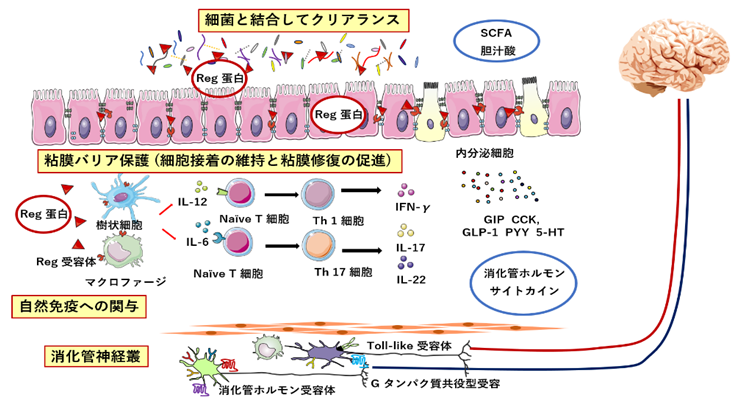The role of Reg family proteins in gut microbiota disturbance and gastrointestinal microinflammation
Information updated: July 31, 2023
- Seeds Information
- Researcher Information
- What do you expect from collaboration with companies?
- Contact for this research
Seeds Information
keyword
Regenerating gene (Reg) protein
Field
Gastrointestinal medicine, inflammatory bowel disease (IBD), irritable bowel syndrome (IBS)
Overview
We have clarified that regenerating gene (Reg) proteins play a role in the regeneration and repair of the gastrointestinal mucosa, and in recent years, they have been attracting renewed attention as they may play an important role in the mucosal defense mechanism as antimicrobial peptides. On the other hand, it has become clear that dysbiosis of the intestinal flora is deeply related to the pathology of not only gastrointestinal diseases such as functional gastrointestinal disorders (FGIDs) and inflammatory bowel diseases (IBD), but also mental and metabolic diseases, and this has attracted attention.
In this study, we aim to clarify the pathogenesis of irritable bowel syndrome (IBS)-like symptoms that occur in FGIDs and IBD in remission. Using various animal models (Reg gene-modified mice, dysbiosis models induced by antibiotics and high-fat diet loading, maternal-fetal separation and social defeat stress models), we are analyzing the functions of Reg family proteins in intestinal bacteria, mucosal barrier function, and immune responses, with the aim of clarifying the role of Reg family proteins in disruption of the intestinal flora and gastrointestinal microinflammation.
In addition to the above basic research, we are also developing a quantitative test method for gastrointestinal mucosal damage using mucosal barrier function as an indicator in human clinical research (patent application in preparation). Together with the above model animal research, we believe that this will contribute to elucidating the pathology and onset mechanisms of FGID, IBD, metabolic syndrome, drug-induced gastrointestinal disorders, etc.
FGID; functional gastrointestinal disorder
IBD; inflammatory bowel disease
IBS; irritable bowel syndrome
What's new?
The importance of Reg family proteins in the intestinal natural immune system has only recently begun to attract attention, and this research, which aims to apply their function to clinical applications, is cutting-edge.
Reg family genes have been identified as the most highly expressed genes in the intestinal mucosa of IBD, and the action/expression of Reg family proteins may suggest their potential as therapeutic agents and biomarkers.
They also reported that Reg is strongly expressed in tumors of the digestive tract and other regions, and clarified the effect of Reg on tumor cells, suggesting its potential as a therapeutic agent and biomarker in cancer treatment.
What are its advantages over other studies?
This is the world's first study to analyze the function of Reg proteins in gastrointestinal tissues, and has the following strengths:
- There is a wealth of relevant research achievements and data on humans and model animals.
- We have a variety of genetically modified models of the Reg family and are poised to make significant advances in our research going forward.
- Our university is a high-volume center for IBD patients, and we are expecting developments in research themes in the field of inflammatory bowel disease.
- Furthermore, in the case of neoplastic diseases, as mentioned above, there is a possibility that these molecules may become target molecules in cancer treatment, and that they may be clinically applicable as markers for assessing the effectiveness of anticancer drug treatment or predicting prognosis. Since our university has a large number of patients undergoing anticancer drug treatment, there is also potential for development of this research topic in this regard.
What problem does it help solve?
It is useful for solving various problems associated with IBD and IBS.
[Drug discovery]
- Reg family proteins are attracting attention as antimicrobial peptides that may have anti-inflammatory effects in the intestinal innate immune system. If they do have anti-inflammatory effects, they could be candidates for treatment of IBD and drug-induced mucosal injury.
- Conversely, it is possible that Reg family proteins are triggers of inflammation. Antibodies or other inhibitors that suppress their action may be potential therapeutic candidates for IBD and drug-induced mucosal injury.
[Diagnosis and testing]
- It is clear that Reg family proteins are highly expressed in IBD, and at the very least, they may serve as markers for assessing the progression of the disease and the effectiveness of treatment.
- Establishing an objective evaluation method for IBS-like symptoms is a challenge, and a new quantitative test method for gastrointestinal mucosal damage using mucosal barrier function as an indicator may lead to a solution to this problem.
Possibility of other applications and developments
Many facilities, including ours, have reported that Reg family proteins are highly expressed not only in inflammatory diseases but also in tumors of the gastrointestinal tract and other regions.
We have demonstrated that Reg proteins play a role in the acquisition of anti-apoptotic activity in tumor cells, and have suggested that they affect the efficacy of anticancer drugs against tumor cells. From this point of view, Reg family proteins may be potential target molecules in cancer treatment. Furthermore, at the very least, they may be clinically applicable as markers for evaluating the efficacy of anticancer drug treatment and for predicting prognosis.
Related Patents
Invention name: Quantitative testing method for gastrointestinal mucosal injury (patent application in preparation)
Related papers
- Sekikawa A, Fukui H, et al. REG Iα protein may function as a trophic and/or anti-apoptotic factor in the development of gastric cancer. Gastroenterology 2005; 128: 642-653.
- Sekikawa A, Fukui H, et al. Possible role of REG Iα protein in ulcerative colitis and colitic cancer. Gut 2005; 54: 1437-1444.
- Nanakin A, Fukui H, et al. Expression of the REG IV gene in ulcerative colitis. Lab Invest 2007; 87: 304-314.
- Fukui H, et al. DMBT1 is a novel gene induced by IL-22 in ulcerative colitis. Inflamm Bowel Dis 2011; 17: 1177-1188.
- Sun C, Fukui H, et al. Expression of Reg family genes in the gastrointestinal tract of mice treated with indomethacin. Am J Physiol Gastrointest Liver Physiol 2015, 308: G736-744.
- Kitayama Y, Fukui H, et al. Role of regenerating gene I in claudin expression and barrier function in the small intestine. Transl Res 2016, 173: 92-100.
- Fukui H, et al. Effect of probiotic Bifidobacterium bifidum G9-1 on the relationship between gut microbiota profile and stress sensitivity in maternally separated rats. Sci Rep 2018, 8: 12384
- Fukui H, et al. Role of gut microbiota-gut hormone axis in the pathophysiology of functional gastrointestinal disorders. J Neurogastroenterol Motil 24:367-386, 2018.
- Xu X, Fukui H, et al. Alteration of GLP-1/GPR43 expression and gastrointestinal motility in dysbiotic mice treated with vancomycin. Sci Rep 2019, 9: 4381.
- Xu X, Fukui H, et al. The link between type III Reg and STAT3-associated cytokines in inflamed colonic tissues. Mediators Inflamm 2019; 7859460.
- Ran Y, Fukui H, et al. Alteration of colonic mucosal permeability during antibiotic-induced dysbiosis. Int J Mol Sci 2020, 21: 6108.
- Fukui H, et al. Usefulness of machine learning-based gut microbiome analysis for identifying patients with irritable bowels syndrome. J Clin Med, 2020, 9: 2403.
- Ebisutani N, Fukui H, et al. Decreased colonic guanylin/uroguanylin expression and dried stool property in mice with social defeat stress. Front Physiol 2020; 11: 599582.
- Nishimura H, Fukui H, et al. Role of the β-catenin/REG Iα axis in the proliferation of sessile serrated adenoma/polyps associated with Fusobacterium nucleatum. Pathogens 2021; 10: 434.
- Sun C, Fukui H, et al. The potential role of REG Family proteins in inflammatory and inflammation-associated diseases of the gastrointestinal tract. Int J Mol Sci 2021; 22: 7196.
- Nakanishi T, Fukui H, et al. Effect of a high-fat diet on the small-intestinal environment and mucosal integrity in the gut-liver axis. Cells 2021; 10: 3168.
- Wang X, Fukui H, et al. Probiotic Bifidobacterium bifidum G9-1 has a preventive effect on the acceleration of colonic permeability and M1 macrophage population in maternally separated rats. Biomedicines 2021; 9: 641.
Researcher Information
| full name | Hirokazu Fukui |
|---|---|
| Affiliation | Department of Gastroenterology, Faculty School of Medicine |
| Specialization | Gastrointestinal medicine, inflammatory bowel disease (IBD), irritable bowel syndrome (IBS) |
| Collaborative Researcher | ― |
| Related links | Course introduction website |
What do you expect from collaboration with companies?
Through collaboration with pharmaceutical and diagnostic drug companies, we hope to conduct the following types of joint research:
- Research into biomarkers and drug discovery targets using model animals and clinical specimens
- Verification research of candidate therapeutic substances owned by pharmaceutical companies for functional dyspepsia, irritable bowel syndrome, IBD, metabolic syndrome, drug-induced gastrointestinal disorders, etc.
- Search for candidate therapeutic agents for the above diseases based on a new quantitative test method for gastrointestinal mucosal injury using mucosal barrier function as an index
Contact for this research
兵庫医科大学 大学事務部 研究推進課
E-mail: chizai@hyo-med.ac.jp
Tel: 0798-45-6488

 Research Seeds Collection
Research Seeds Collection
